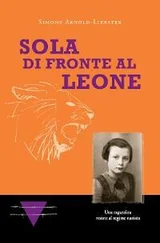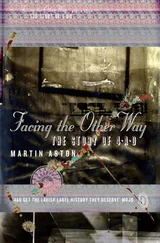In the midst of rocks, ferns, and undergrowth, stood my grandparents’ house. After entering through the tiny door, a person’s eyes would have to adjust to the dim light before it was possible to make out the huge black chimney in the corner. Into this chimney, a big kitchen stove had been set. The odor of smoke mixed with the aroma of hay and cereals was the best of fragrances to me. Outside of the house was a stone-hewn fountain. The sound of the bubbling water in the fountain had been a soothing lullaby for generations.
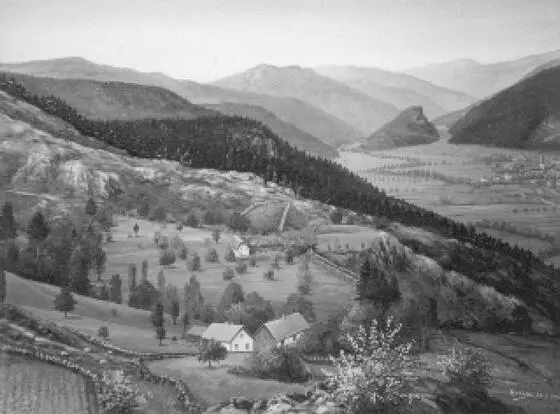
Oil painting of Bergenbach by Adolphe Arnold
In the 1890s, my grandmother Marie had left the ancestral home only to return widowed with two girls—Emma and Eugenie, my mother and my aunt. Remy Staffelbach, my grandmother Marie’s second husband, fathered my Aunt Valentine and Uncle Germain. Remy was a true grandpa to me.
Grandma was a very industrious woman who took care of all of the animals and the garden while the men went off to their jobs.
Grandpa was a color mixer in the printing factory, and Uncle Germain hewed stone in a quarry. Grandma always fretted about Uncle Germain. Because he was deaf, she worried that Uncle Germain might not get the message that the rock was about to be dynamited. Whenever she heard a blast from the quarry, no matter where she was or what she was doing, she would stop and say a prayer for her son.
With tears in her eyes, Grandma would tell me the same story over and over again: “Your mother wanted to become a nun, a missionary in Africa. We went to the convent to see about it, but the required donation was just too high. We would have had to sell all our cows.” I wondered to myself why it was necessary to sell cows to serve God.
“The family decided that she should work and use some of her earnings to pay for Germain’s boarding school. That’s how she became a weaver of damask and met your father, Adolphe. He was a penniless orphan and an artist—not a farmer—but at least he was a strong Catholic.”
Uncle Germain and I communicated easily. I enjoyed his lively homemade sign language.
Uncle Germain also did carpentry work, stone carving, and tree grafting. He had ten beehives. Each time we came for a visit, he showed us his latest achievement with a broad, happy grin. His joy in life was to be productive. Germain was very attached to his mother and, because of her, he was very religious. So was I.
When she was young, Grandma must have been beautiful. Her attractive features had hardly diminished with age. Her deep blue eyes paled next to her sunburned complexion. A small chignon of white hair on top of her head looked like a halo. During the week, Grandma wore a stern black dress covered by a big apron. But on Sundays, she wore a flowered dress with tiny pink or lilac flowers that softened her serious face.
Grandma was a little heavy, yet always quietly on the move. As soon as I came into the kitchen, she would launch into lively talk. “Let’s get the soup done for the little hog—with some potatoes.” She would mash them in her hand. “We will get some bran, our leftovers from the noon dishes, no bones, and the whey from the cheese...come, Little Girl, we’ll pour it into the manger...” The hog’s pink nose went in the soup... ch-ch-ch. “Look how foolish—it searches for the best pieces first!”
All of the chickens would gather in front of the kitchen door. “It must be five o’clock. We’ll give them some corn.”
“Back, back,” she’d say, clapping her hands and sending the vigorous ones flying onto each others’ backs. “Little Girl, see that! Just like people, no consideration for the weak.”
“Now let’s call the cats. ‘Busala busala, come...here is your milk.’” It was the foam of the milk from the cow that Grandpa had just milked. I had already had my share in a special black cup, my cup. The cats rubbed up against our legs and purred. One of them let her little one drink first. “You see, that is a true mother, and most everyone says thank you.”
Whenever possible, my parents and I would go to Bergenbach on weekends. I got to attend the great Mass with Grandpa, which was such a treat. Uncle Germain would leave the house after us, but somehow he would always beat us to church. After Mass, we three would go to the café where all of the men of the village gathered. They often talked politics, either that or about farm animals: “I bought a cow from the horse dealer.” “Which one? The Jew or the Alsatian?” “From the Jew, and he cheated me again!” “Why don’t you go to the Alsatian?” “Well, he’s too expensive. He always inflates the quality and price of his animals. He is dishonest!” I couldn’t follow their reasoning. Why did they hate Jews and yet prefer to buy from them? It didn’t make any sense.
Climbing the mountain back up to Bergenbach, at high noon in the summertime was, as Grandma said, penance that added more value to our church attendance. She must have been right, but in the summer I wished it weren’t quite so hot!
Grandpa’s face was almost as red as his hair. He wore a dark brown velvet suit with a golden chain for the watch he kept tucked in his vest pocket. He would undo all of the buttons and with his handkerchief, constantly wiped off his neck. Uncle Germain always headed home ahead of us, running off like a gazelle; then he would hide and wait for us. As we passed by, he would jump out at us with his special “horse laugh!”
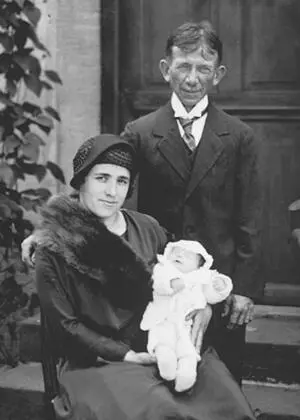 |
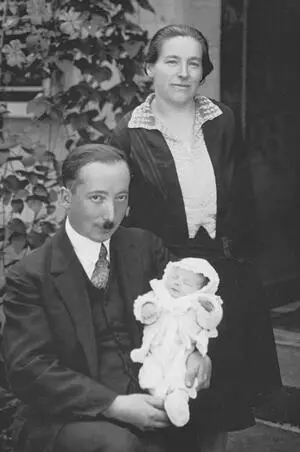 |
| Aunt Eugenie with Simone and Grandfather-Godfather Paul Arnold, August 1930 |
Father and Mother with Simone |
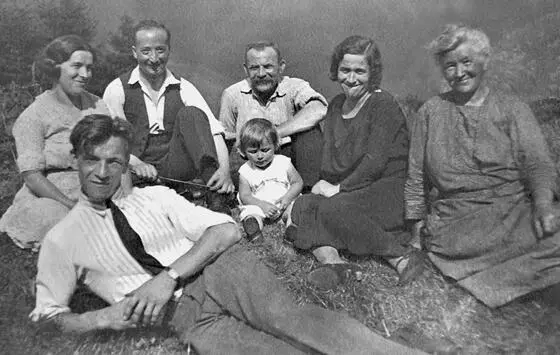
(from rear left) Mother, Father, Grandpa Remy, Aunt Eugenie, Grandma Marie, and Uncle Germain; Simone in center
Grandma attended the early Mass so she could be home in time to cook our delicious Sunday meals that included special homemade pastries of all kinds. At the meals, the chats were always interesting and lively, but always peaceful, as long as we were six at the table. How different when Grandma’s youngest daughter, my Aunt Valentine, came with her husband, Alfred, and my cousin Angele. Alfred, a tall man, always took over—he knew it all! While Alfred talked and talked, my father sat there silent. I didn’t like that. My father was smarter—why didn’t he speak up?
Drawing battle lines seemed to be Uncle Alfred’s regular goal, and it wasn’t hard to accomplish. Grandpa disliked the harsh German authority. He had served in the German maritime service for four years and had seen with his own eyes how a rebellious sailor was punished: A rope was tied around his waist, and then he was thrown into the sea and dragged behind the ship for hours. I thought that those sailors must have been very fast swimmers to be able to keep up with the ship!
Grandma always picked on the French, calling them lazy. She hadn’t forgotten that during the Great War, the French army had fed on her cows and never compensated her for them. But she had nothing but glowing praise for Hitler’s achievements in Germany.
Читать дальше









